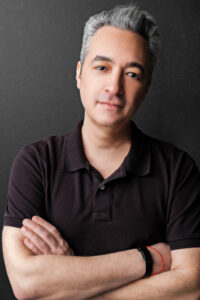A Point of Pride: Interview with Robert Levy

ROBERT LEVY‘s novel The Glittering World was a finalist for the Shirley Jackson Award as well as the Lambda Literary Award, while shorter work has appeared in The Magazine of Fantasy & Science Fiction, Nightmare, Black Static, The Dark, Shadows & Tall Trees, Autumn Cthulhu, FOUND: An Anthology of Found Footage Horror Stories, The Best Horror of the Year, The Year’s Best Hardcore Horror, and The Year’s Best Gay Speculative Fiction, among others. His debut story collection No One Dies from Love: Dark Tales of Loss and Longing was published by Word Horde in May. A Harvard graduate subsequently trained as a forensic psychologist, he teaches at the Stonecoast MFA Program in Creative Writing and can be found at TheRobertLevy.com.

![]()
![]()
What inspired you to start writing?
I’ve been writing since I was a teenager, so I honestly don’t remember the initial spark, but it’s always been something I’ve enjoyed and been good at (which don’t always go together). Having that well of early writing to draw from has been a great gift—in fact, one story in my new collection is a revision of a piece I wrote in college, while another is based on a play I wrote in high school. In a way, it’s also not surprising, given that as writers we’re often circling back to the same concerns and obsessions anyway!
What was it about the horror genre that drew you to it?
Horror, to put it bluntly, is the genre of death, and I’ve pretty much always had a thing for death. I’m not really sure where that fascination comes from, although I sometimes attribute it to the death of a nursery school classmate who choked on a hot dog. I wondered where he went after he died, and when no one could give me a proper answer that question began to burn all the more brightly. Here I am, 45 years later, and still asking it. What better way to explore such a vast unknowable than through the lens of horror?
Do you make a conscious effort to include LGBTQ material in your writing, and if so, what do you want to portray?
If it makes sense for the story for one or more of the characters to be queer then absolutely, but otherwise it depends. The same goes for the portrayals of the characters. If it serves the story for a character to be noble or aggrieved or toxic, then that’s what they’ll be—I have no interest in producing “positive” or “likable” portrayals of anyone, queer or not. I completely understand why some people feel differently, but that’s just not my bag.
What has writing horror taught you about the world and yourself?
Fundamentally, that the past is always present. No matter how much we try to keep it buried, it always finds its way back.
How have you seen the horror genre change over the years? And how do you think it will continue to evolve?
The general quality and the range of subject matter within horror has exploded, and will continue to do so as more writers are drawn to the genre. A massive amount of credit has to go to independent films of the A24 variety that have shown moviegoers (who are hopefully also readers) that horror can be as well-made as any other genre. Those of us in the know have, of course, been aware of this all along.
How do you feel the LGBTQ community has been represented thus far in the genre. and what hopes do you have for representation in the genre going forward?
The pendulum has swung from queer people being villains and victims to heroes and warriors. I’d like the genre to evolve even further, and allow queer creators to make their characters whatever it is we want them to be in order to serve the story, regardless of issues of representation. Trust us.
Who are some of your favorite LGBTQ characters in horror?
The first one that comes to mind is Cass Neary, Elizabeth Hand’s mad, bad, and dangerous-to-know bisexual photographer. The second is Theo, the queer sensitive from Shirley Jackson’s The Haunting of Hill House. Not only that, but this October will see the release of A Haunting on the Hill, a sequel to The Haunting of Hill House authorized by the Jackson estate and written by none other than the aforementioned Elizabeth Hand! If there are no queer characters in that one, I’m going to demand a recount.
Who are some LGBTQ horror authors you recommend our audience check out?
Clive Barker, Michael McDowell, Caitlín R. Kiernan, Lee Thomas, Rivers Solomon, Sam Miller, Eric LaRocca, Gwendolyn Kiste, Carmen Maria Machado, and so, so many more.
What is one piece of advice you would give horror authors today?
Stop trying to write like Stephen King. I love him as much as the next horror fan, but if I see one more novel that reads like King warmed over I’m going to go full Jack Torrance.
And to the LGBTQ writers out there who are just getting started, what advice would you give them?
Embrace your inner outsider, and don’t be so desperate to be liked. A lot of us accrued an alarming amount of childhood trauma, and the answer isn’t to replicate the popularity contests of our youth, which were never going to make us happy in the first place. When it comes to your actual art, your outsider status and the unique perspective it grants you is your secret weapon. Use it accordingly.



